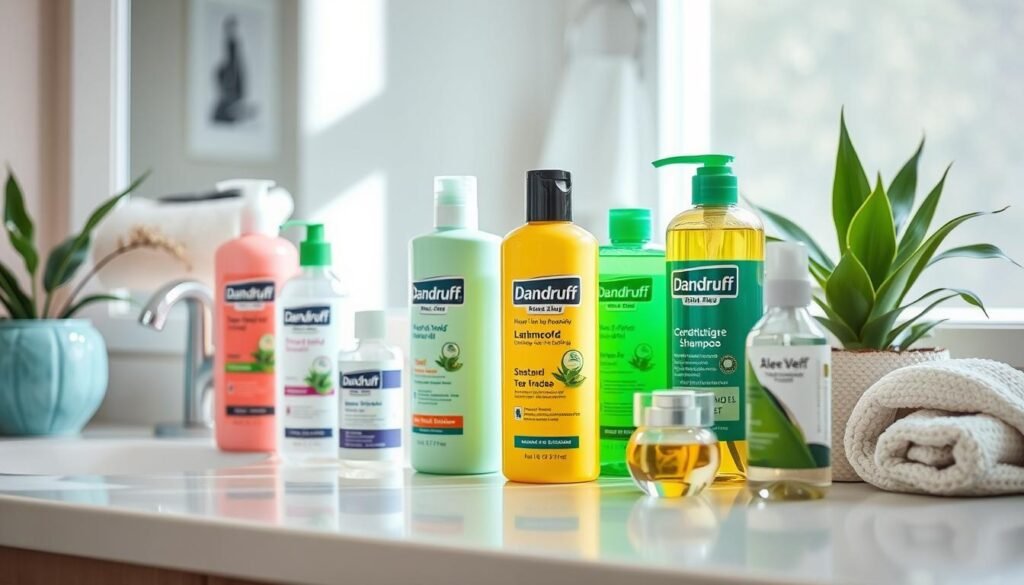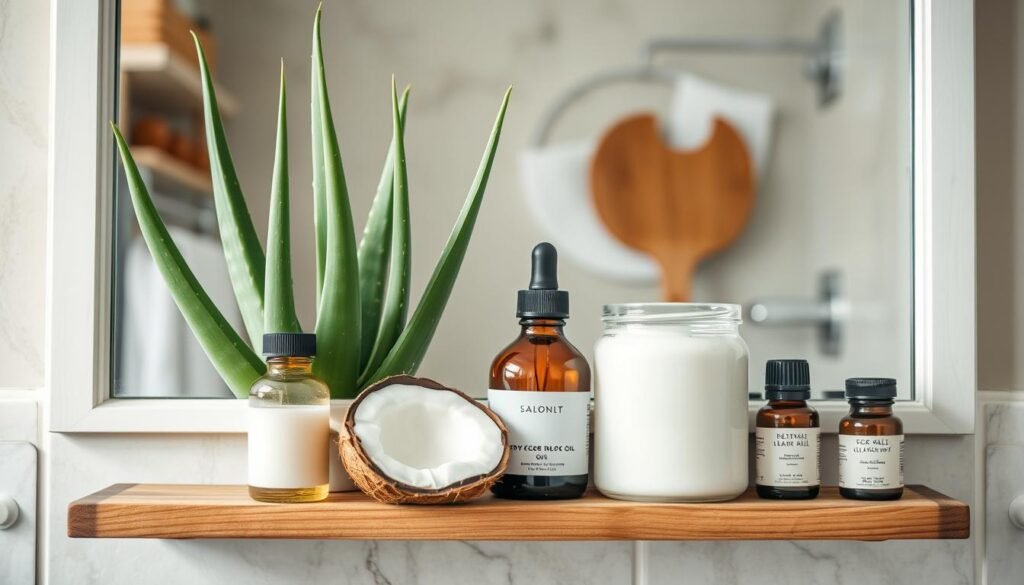Did you know nearly half of adults face dandruff at some time? This problem can make your scalp itchy, cause flakes, and feel embarrassing. It’s key to know how to tackle dandruff. Many treatments are out there to help those affected. This piece talks about what causes dandruff and its symptoms. We also explore treatments like special shampoos, natural fixes, and medical approaches for lasting relief.
Key Takeaways
- Nearly half of adults struggle with dandruff at some stage in life.
- Effective dandruff treatment can enhance quality of life.
- Understanding the sources of dandruff is vital for finding the right solutions.
- Scalp care solutions are essential for maintaining healthy skin.
- Diverse treatment options are available for varying severity levels of dandruff.
- Natural remedies can complement conventional treatments for optimal results.
Understanding Dandruff and Its Causes
Dandruff shows up as flaky skin on the scalp. This can make people feel less confident about how they look. Let’s look at what causes this common problem. Dry skin is often to blame. Yet, serious conditions like seborrheic dermatitis also lead to flaking. Fungal infections disturb scalp health too. This results in itching and discomfort.
Furthermore, being sensitive to hair products can cause dandruff. Some react badly to certain shampoos or conditioners. Knowing about these causes helps us deal with dandruff better. Stress and hormonal shifts can also worsen skin issues. So, it’s important to figure out what triggers your dandruff.
For more info on dandruff causes and solutions, click here. Understanding and addressing these elements is key. It helps keep the scalp healthy and helps find the best treatment.
Common Symptoms of Dandruff
Dandruff shows through dandruff symptoms that affect daily life. People find white or yellow skin flakes on their scalp and clothes. These flakes can be big or small and are often embarrassing.
Many feel an itchy scalp, causing discomfort and distraction all day. This itchiness makes people want to scratch, leading to redness or inflammation in some cases.
Knowing these symptoms helps tell if it’s dandruff or something else. Comparing these signs with other scalp conditions can help find the right treatment. For more information, visit this link.
In short, visible flakes, itchiness, and sometimes inflammation point to dandruff. Early action can help manage and ease these symptoms.
Dandruff: Treatment
Finding the right dandruff treatment can really boost someone’s comfort and confidence. There are many methods available, from anti-dandruff shampoos to home remedies. It’s important to explore these options to find what suits you best.
Overview of Treatment Options
With so many dandruff treatments out there, people can choose what works for them. Whether it’s anti-dandruff shampoos with zinc pyrithione or natural solutions like tea tree oil. Each has its unique benefits, tackling dandruff in different ways.
Let’s take a closer look at the options available:
| Treatment Type | Main Ingredients | Benefits |
|---|---|---|
| Anti-Dandruff Shampoo | Zinc pyrithione, Ketoconazole | Reduces flakes, controls oil production |
| Natural Remedies | Tea tree oil, Apple cider vinegar | Soothing, anti-fungal, promotes a nourishing scalp |
| Scalp Treatments | Salicylic acid, Coal tar | Exfoliates scalp, reduces itchiness |
Importance of Scalp Care
Looking after your scalp is key to fighting dandruff. Good scalp care helps prevent dandruff and makes treatments work better. Using the right products keeps your scalp healthy, avoiding irritants.
Good scalp care might include regular washes with gentle shampoos. Using soothing conditioners and nourishing scalp masks can also help.
- Washing hair regularly with appropriate shampoos
- Using conditioners that hydrate and do not irritate
- Applying scalp masks for deep nourishment

Exploring Anti-Dandruff Shampoos
Anti-dandruff shampoos are key in fighting dandruff and keeping a healthy scalp. Many types exist, each offering specific benefits. It’s important to know these to choose the best one for your needs.
Types of Anti-Dandruff Shampoos
There are several anti-dandruff shampoos on the market. Each targets dandruff in a different way. Here are some of the common ones:
- Zinc Pyrithione Shampoos: These shampoos are great against fungal growth. They interrupt the fungus life cycle that causes dandruff.
- Ketoconazole Shampoos: For severe dandruff, this ingredient is very effective. It tackles lasting scaliness well.
- Selenium Sulfide Shampoos: Best for oily scalps, they decrease flakiness and control symptoms.
- Salicylic Acid Shampoos: These have exfoliating effects. They remove dead skin and reduce itching.
Ingredients to Look For
When choosing an anti-dandruff shampoo, think about the ingredients. Some are key to fighting dandruff effectively:
| Ingredient | Benefit |
|---|---|
| Tea Tree Oil | Acts as a natural fungus fighter. It soothes and helps with scalp issues. |
| Aloe Vera | It moisturizes and fights inflammation, boosting scalp health. |
| Coal Tar | Slows cell turnover. This reduces scaling and flaking. |
Natural Remedies for Dandruff Relief
Exploring natural solutions for dandruff can lead to gentle and effective relief. Essential oils are popular for their healing properties. They boost scalp health, making hair shinier and healthier when used regularly.
Essential Oils for Scalp Health
Tea tree, peppermint, and lavender oils are great for fighting dandruff. Tea tree oil attacks fungi and bacteria, reducing dandruff. Peppermint oil stimulates the scalp with a cool sensation, improving health.
Lavender oil smells good and reduces inflammation. This can calm irritated skin on the scalp.
Mix these oils with coconut or jojoba oil to avoid irritation. Combining a few drops of essential oil with a tablespoon of carrier oil works well. Massage this blend into the scalp for relief and nourishment.
Home Treatments Using Kitchen Ingredients
Kitchen remedies can be simple yet effective against dandruff. Apple cider vinegar, coconut oil, and lemon juice are commonly used. Apple cider vinegar balances scalp pH and has antibacterial qualities that combat dandruff.
Coconut oil moisturizes the scalp, reducing dryness and itchiness. Apply it and leave for 30 minutes before washing for better scalp health. Lemon juice removes dead skin cells and provides vitamin C, supporting healthy skin and hair.
Using these kitchen remedies regularly can significantly improve your scalp’s condition. They promote healthier hair and scalp. For more tips on dandruff management, check this resource for effective treatments.
Medicated Treatments for Severe Cases
People with severe dandruff need effective treatments. Medicated shampoos and prescriptions help manage symptoms. Knowing when to use these is key to relief.
Prescription Shampoos and Their Uses
Prescription shampoos are strong options for tough dandruff. Corticosteroid shampoos and medicated foams are popular. They reduce inflammation and flakes.
Apply them to wet hair for best results. Following a dermatologist’s advice ensures optimal management of dandruff.
Oral Medications for Persistent Dandruff
Oral medications help when shampoos don’t work. Antifungal tablets address the root fungal causes. Doctors decide the best treatment based on each person’s case.
Starting treatment early helps those at risk. It improves scalp health and comfort.
| Treatment Type | Indications | Active Ingredients | Common Brands |
|---|---|---|---|
| Prescription Shampoos | Severe dandruff, inflammation | Corticosteroids, coal tar | Ketoconazole, Selenium Sulfide |
| Oral Medications | Persistent or severe conditions | Antifungals | Fluconazole, Itraconazole |
Addressing Seborrheic Dermatitis
Seborrheic dermatitis is a long-term scalp problem, similar to but not the same as dandruff. Knowing the differences helps us treat it better. While regular dandruff can make your scalp flaky and itchy, seborrheic dermatitis is worse. It causes crusty patches, red skin, and lots of irritation.
Spotting the signs of seborrheic dermatitis means you can get the right help. These signs include:
- Persistent itchiness
- Flaky scalp with yellowish scales
- Inflamed skin on the scalp and other oily areas
To treat seborrheic dermatitis, medicated shampoos are often used. These shampoos have special ingredients like zinc pyrithione, ketoconazole, or coal tar. They deal with the root causes like yeast overgrowth and too much oil, easing the symptoms.
Other helpful treatments are topical steroids and antifungal creams. These can lessen redness and inflammation, and manage outbreaks. Using these treatments regularly is crucial for keeping seborrheic dermatitis under control.
Trying lifestyle changes can also improve your skin’s health. Things like eating well and handling stress better can help. Knowing how seborrheic dermatitis differs from plain dandruff is the first step towards better treatment and relief.
| Symptom | Seborrheic Dermatitis | Chronic Dandruff |
|---|---|---|
| Itchiness | Persistent | Occasional |
| Scale Color | Yellowish, greasy | White, dry |
| Inflammation | Common | Rare |
| Location of Flaking | Scalp and face | Primarily scalp |
Identifying Fungal Infections as a Cause
Fungal infections are often a big worry when it comes to scalp health. They are commonly linked to the yeast Malassezia. This yeast grows on the scalp and can lead to dandruff. To tackle this problem, it’s vital to recognize the symptoms early on.
These symptoms include constant itching, skin flakes, and a red scalp. Spotting these signs can help you deal with the issue faster.
To fight these infections, many treatments are out there. Over-the-counter medicated shampoos can work wonders. They often contain ketoconazole and selenium sulfide which stop the yeast from growing too much.
Keeping your scalp in good shape is key. You want to cut down on things that make yeast grow. Here are some tips:
- Choose the right shampoo and wash your hair regularly.
- Use conditioner to stop dryness but pick ones that don’t cause buildup.
- Steer clear of strong styling products to avoid irritating your scalp.
If you need more help in dealing with dandruff from fungal infections, check out this helpful article. By being proactive, you can keep your scalp healthy and avoid more problems down the line.
| Symptom | Possible Treatment |
|---|---|
| Persistent Itching | Medicated shampoos with antifungal properties |
| Scalp Flaking | Shampoos containing zinc pyrithione |
| Irritated Skin | Gentle moisturizing shampoos |
Dry Scalp Solutions Beyond Shampoo
Beating dry scalp takes more than just the right shampoo. Effective solutions add the moisture needed for scalp health. They also keep moisture levels balanced. Feeding the scalp helps you feel better. It also boosts the health of your hair and skin. We’ll look at how to hydrate better and tweak your hair care to lock in moisture.
Hydration and Moisture Treats
Adding moisture treatments to your routine is key for fighting dryness. Some top hydration picks are:
- Hair masks with nourishing ingredients like avocado, coconut oil, or honey.
- Scalp oils with essential oils, like tea tree or peppermint, for balance and health.
- Leave-in conditioners for moisture all day.

Adjusting Your Hair Care Regimen
Choosing the right hair care routine boosts scalp moisture and health. Making small changes can have big benefits. Important tweaks include:
- Opting for gentle, sulfate-free cleansers.
- Using a wide-tooth comb for less breakage and better oil spread.
- Limiting heat styling to keep in moisture.
- Massaging the scalp regularly to boost blood flow and help hydration sink in.
These steps can make a big difference in keeping your scalp healthy. They prevent dryness and make you more comfortable.
Dermatologist Recommendations for Dandruff
Dermatologists are key to tackling dandruff and keeping a healthy scalp. They stress the need for regular check-ups. This helps them create treatment plans just for you. They look at the causes of dandruff like dry or oily skin and fungal infections.
Dermatologists also suggest changes in how we live and treat our hair. Using a gentle scrub on your scalp helps. So does avoiding strong hair care products. They might recommend special shampoos with ingredients like ketoconazole or zinc pyrithione.
Working with a dermatologist brings the best advice for lasting solutions. It’s important to find the right treatment without harming your scalp. With their help, your scalp can stay healthy. This makes you feel better about how you look.